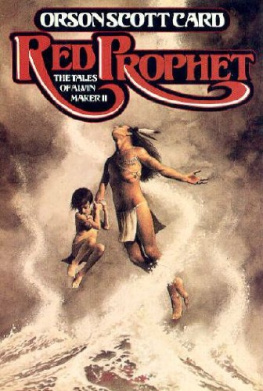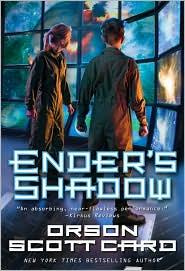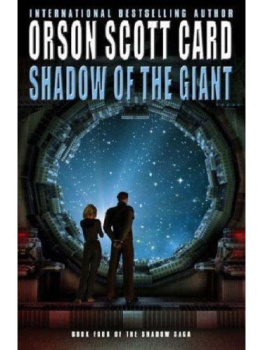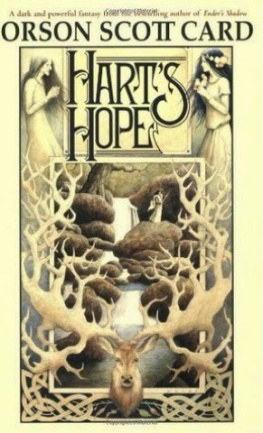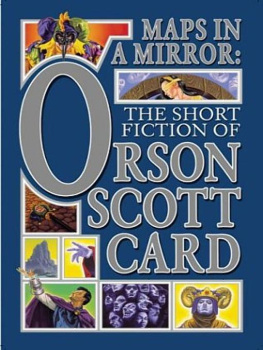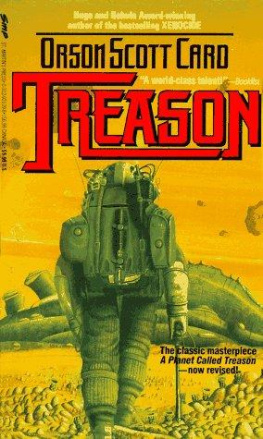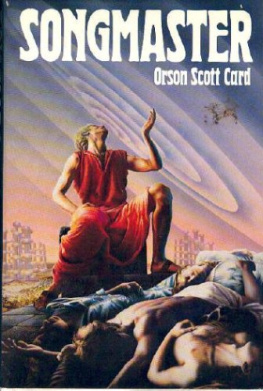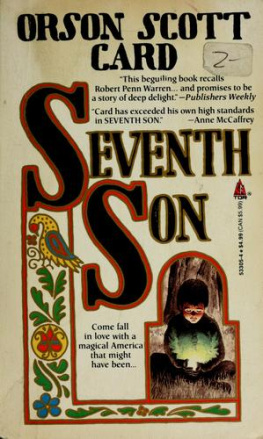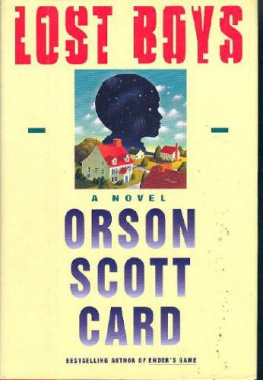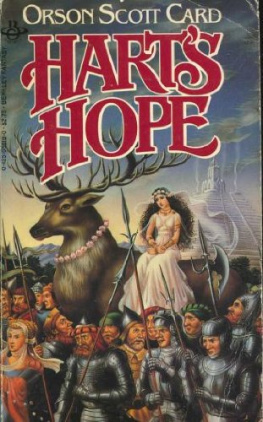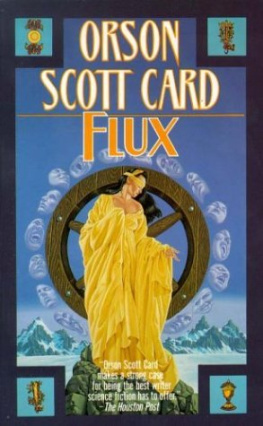Orson Scott Card
Pastwatch: The Redemption Of Christopher Columbus
Pastwatch
Some people called it "the time of undoing"; some, wishing to be more positive, spoke of it as "the replanting" or "the restoring" or even "the resurrection" of the Earth. All these names were accurate. Something had been done, and now it was being undone. Much had died or been broken or killed, and now it was coming back to life.
This was the work of the world in those days: Nutrients were put back in the soil of the great rain forests of the world, so the trees could grow tall again. Grazing was banished from the edges of the great deserts of Africa and Asia, and grass was planted so that steppe and then savanna could slowly reconquer territory they had lost to the stone and sand. Though the weather stations high in orbit could not change the climate, they tweaked the winds often enough that no spot on Earth would suffer drought or flood, or lack for sunlight. In great preserves the surviving animals learned how to live again in the wild. All the nations of the world had an equal claim on food, and no one feared hunger anymore. Good teachers came to every child, and every man and woman had a decent chance to become whatever his or her talents and passions and desires led them to become.
It should have been a happy time, with humanity pressing forward into a future in which the world would be healed, in which a comfortable life could be lived without the shame of knowing that it came at someone else's expense. And for many -- perhaps most -- it was. But many others could not turn their faces from the shadows of the past. Too many creatures were missing, never to be restored. Too many people, too many nations now lay buried in the soil of the past. Once the world had teemed with seven billion human lives. Now a tenth that number tended the gardens of Earth. The survivors could not easily forget the century of war and plague, of drought and flood and famine, of desperate fury leading to despair. Every step of every living man and woman trod on someone's grave, or so it seemed.
So it was not only forests and grasslands that were brought back to life. People also sought to bring back the lost memories, the stories, the intertwining paths that men and women had followed that led them to their times of glory and their times of shame. They built machines that let them see into the past, at first the great sweeping changes across the centuries, and then, as the machinery was refined, the faces and the voices of the dead.
They knew, of course, that they could not record it all. There were not enough alive to witness all the actions of the dead. But by sampling here and there, by following this question to its answer, that nation to its end, the men and women of Pastwatch could tell stories to their fellow citizens, true fables that explained why nations rose and fell; why men and women envied, raged, and loved; why children laughed in sunlight and trembled in the dark of night.
Pastwatch remembered so many forgotten stories, replicated so many lost or broken works of art, recovered so many customs, fashions, jokes, and games, so many religions and philosophies, that sometimes it seemed that there was no need to think up anything again. All of history was available, it seemed, and yet Pastwatch had barely scratched the surface of the past, and most watchers looked forward to a limitless future of rummaging through time.
Chapter 1 -- The Governor
There was only one time when Columbus despaired of making his voyage. It was the night of August 23rd, in the port of Las Palmas on Grand Canary Island.
After so many years of struggle, his three caravels had finally set sail from Palos, only to run into trouble almost at once. After so many priests and gentlemen in the courts of Spain and Portugal had smiled at him and then tried to destroy him behind his back, Columbus found it hard to believe that it wasn't sabotage when the rudder of the Pinta came loose and nearly broke. After all, Quintero, the owner of the Pinta, was so nervous about having his little ship go out on such a voyage that he had signed on as a common seaman, just to keep an eye on his property. And Pinzn told him privately that he had seen a group of men gathered at the stern of the Pinta just as they were setting sail. Pinzn fixed the rudder himself, at sea, but the next day it broke again. Pinzn was furious, but he vowed to Columbus that the Pinta would meet him at Las Palmas within days.
So confident was Columbus of Pinzn's ability and commitment to the voyage that he gave no more thought to the Pinta. He sailed with the Santa Maria and the Niha to the island of Gomera, where Beatrice de Bobadilla was governor. It was a meeting he had long looked forward to, a chance to celebrate his triumph over the court of Spain with one who had made it plain she longed for his success. But Lady Beatrice was not at home. And as he waited, day after day, he had to endure two intolerable things.
The first consisted of having to listen politely to the petty gentlemen of Beatrice's little court, who kept telling him the most appalling lies about how on certain bright days, from the island of Ferro, westernmost of the Canaries, one could see a faint image of a blue island on the western horizon-- as if plenty of ships had not already sailed that far west! But Columbus had grown skilled at smiling and nodding at the most outrageous stupidity. One did not survive at court without that particular skill, and Columbus had weathered not only the wandering courts of Ferdinand and Isabella, but also the more settled and deeply arrogant court of John of Portugal. And after waiting decades to win the ships and men and supplies and, above all, the permission to make this voyage, he could endure a few more days of conversation with stupid gentlemen. Though he sometimes had to grind his teeth not to point out how utterly useless they must be in the eyes of God and everyone else, if they could find nothing better to do with their lives than wait about in the court of the governor of Gomera when she was not even at home. No doubt they amused Beatrice -- she had shown a keen appreciation of the worthlessness of most men of the knightly class when she conversed with Columbus at the royal court at Santa Fe. No doubt she skewered them constantly with ironic barbs which they did not realize were ironic.
More intolerable by far was the silence from Las Palmas. He had left men there with instructions to tell him as soon as Pinzn managed to bring the Pinta into port. But no word came, day after day, as the stupidity of the courtiers became more insufferable, until finally he refused to tolerate either of the intolerables a moment longer. Bidding a grateful adios to the gentlemen of Gomera, he set sail for Las Palmas himself, only to find when he arrived on the 23rd of August that the Pinta was still not there.
The worst possibilities immediately came to mind. The saboteurs were so grimly determined not to complete the voyage that there had been a mutiny, or they had somehow persuaded Pinzn to turn around and sail for Spain. Or they were adrift in the currents of the Atlantic, getting swept to some unnameable destination. Or pirates had taken them -- or the Portuguese, who might have thought they were part of some foolish Spanish effort to poach on their private preserve along the coasts of Africa. Or Pinzn, who clearly thought himself better suited to lead the expedition than Columbus himself -- though he would never have been able to win royal sponsorship for such an expedition, having neither the education, the manners, nor the patience that it had required -- might have had the foolish notion of sailing on ahead, reaching the Indies before Columbus.
All of these were possible, and from one moment to the next each seemed likely. Columbus withdrew from human company that night and threw himself to his knees -- not for the first time, but never before with such anger at the Almighty. "I have done all you set for me to do," he said, "I have pushed and pleaded, and never once have you given me the slightest encouragement, even in the darkest times. Yet my trust never failed, and at last I got the expedition on the exact terms that were required. We set sail. My plan was good. The season was right. The crew is skilled even if they think themselves better sailors than their commander. All I needed now, all that I needed, after everything I've endured till now, was for something to go right."
Next page
